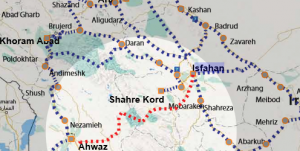 Iran Ministry of Roads and Urban Development and Mapna Group signed a Memorandum of Understanding for the construction of Esfahan-Ahvaz railway line.
Iran Ministry of Roads and Urban Development and Mapna Group signed a Memorandum of Understanding for the construction of Esfahan-Ahvaz railway line.
Linking Ahvaz, the centre of the southwestern Khuzestan Province, and the central city of Esfahan, the 510-km railway line will run mainly through mountainous regions. 50% of the total length of the line will cross mountainous areas, 30% in hills areas, while 20% on its route will run on flat terrain.
Mapna will implement the project under an engineering-procurement-construction (EPC) contract and will also be responsible for financing the project.
The MoU was signed by Mohammad Eslami, the Minister of Roads and Urban Development, Mapna President, Abbas Aliabadi, and the CEO of the Construction and Development of Transport Infrastructure Company, Kheirollah Khademi.
It is estimated that EUR 3 billion is the needed investment for the long-awaited double-track railway project.
According to the Ministry of Roads and Urban Development, the Esfahan-Ahvaz railway line is estimated at EUR 4.95 billion. It is expected that the construction works will be performed within six years.
Once complete, the railway connection is expected to relieve the freight and passenger traffic of Esfahan-Ahvaz road by nearly half, increasing safety rate and reducing traffic accidents and pollution along the entire route.
The steel industry of Khuzestan Province will also be a main beneficiary of the rail route and services, receiving a cheaper and faster supply of iron ore from central Iran.
16.5 million tonnes is the estimated annual capacity in the first year, and in the next two decades the traffic will reach a volume of 27.7 million tonnes. The passenger traffic will increase from 1.3 million passengers to 2 million passengers.
The project is part of Ministry’s development plan developed by the Construction & Development of Transport Infrastructure Company. The entire programme includes 19 railway projects totalling more than 5,600 km. These projects will require an investment of EUR 12.8 billion.
Share on:



